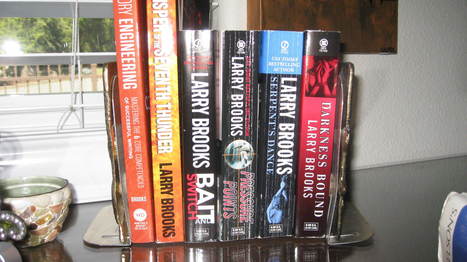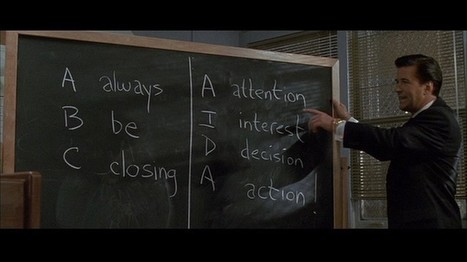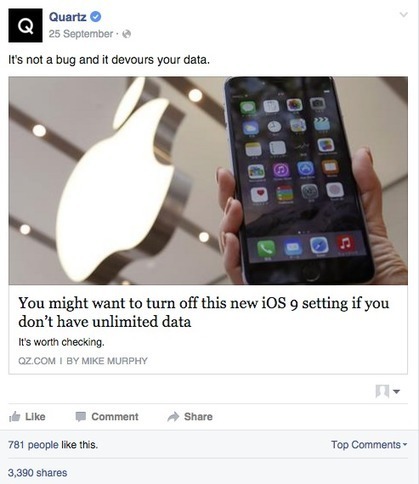 Your new post is loading...
 Your new post is loading...
Your website copy is responsible for more than just presenting your visitors with basic information. In fact, your words alone have the ability to influence how visitors feel about your brand, what they choose to click (or not click), and how your site ranks in search engines. How can you ensure that it's working the way you want it to? Testing. Sometimes the tiniest change in word choice can have a major impact on your conversion rates. While the difference between a checkout button that reads “Add to Cart” rather than “+Cart” might seem insignificant, it can significantly alter your website's performance. Still not convinced? Check out these 13 case studies that prove word choice does indeed matter when it comes to optimizing for conversions....
Awesome Copywriting Examples
Any description I write for this collection will pale in comparison to the excellent copywriting examples contained herein....
The biggest problem with how people write now is that they are out of touch with how people read now. People read online, and the average article gets 20 seconds of attention.
But writing short is not so easy. It takes discipline. Poynter Institute senior scholar Roy Peter Clark wants to help you to develop that discipline. He is a student of everything from tweets to headlines to fortune cookies to song lyrics. In a series of short (of course) chapters, he opens your eyes to how short writers do what they do.
As he says, “When it comes to the how of short writing, you will find three paths: learning short writing through reading; practicing the best short writing moves; and cutting longer texts down to size.” This is what he teaches; you should learn it....
"The great writer's gift to a reader is to make him a better writer." “Stories,” Neil Gaiman asserted in his wonderful lecture on what makes stories last, “are genuinely symbiotic organisms that we live with, that allow human beings to advance.” But what is the natural selection of these organisms — what makes the ones that endure fit for survival? What, in other words, makes a great story?
Via Mary Daniels Brown
As we look forward to the coming year, the self-publishing world will undoubtedly present us with a few new surprises. As self-publishers, you probably have some thoughts on this topic as well. So, I felt it was timely to take a pause to collect a few 2016 predictions from some of the pros—those experts who have a proverbial finger on the pulse of industry changes. Many of these folks you will recognize as they have served us as reliable resources for BookWorks in the past. They include marketing strategists, publishers, and bloggers, in addition to the founder of Smashwords, one of the top self-publishing platforms in the world.
Learn about their prognostications and what they had to say when asked the question, “What do you predict for the self-publishing industry in 2016?”...
Last year I did a post for the Writers Digest website, explaining why (my opinion) “just write” is among the most dangerous soundbytes of writing advice ever uttered. It’s like telling someone about to on trial without a lawyer (an apropos analogy to trying to write a story without knowing how to write a novel) to skip law school and “just talk.” One reader commented in response that, because after years of practice some writers can indeed “just write” and be successful… I thank her for helping make my point.
There is a huge, hard-won backlog of knowledge and principle that makes anything that can otherwise be “made up as you go along” functional, if not downright fatal.
“Just do it” can get you killed, and it can kill your story, as well.
In that context, I’ve yet to encounter a writer who can disprove the existence or need for a largely given structure – the order and context for how a story should flow – for the rendering of long form storytelling....
The recent poll on the Now Novel blog reminded us of one of writers’ greatest challenges: finding time to write. Not knowing how to find time to write often simply means not prioritizing your writing.
Here is how 12 writers have made time in their own busy lives to prioritize their creative work and write...
Coming up with exciting content is a bit tricky though, not just because everything has already been done to death, so it’s hard to come up with anything original, but also because once you set out to create it, it seems as if everything is turning against you and wants to prevent you from creating it. You name it: procrastination (although that one is on you), writer’s block (a little bit on you), distractions, the agony of having to edit your work, the list is seemingly endless.
We've mentioned tools to help with content marketing several times at Smart Insights. We thought it worth mentioning these tools because whilst you may already be using the likes of Trello and Hootsuite, these less well-known tools may also help you be that extra bit more effective when it comes to writing content....
When you’re planning to write, but before you’re actually writing, you create an outline. Unfortunately, most outlines are worthless. You need a better outline: a fat outline.
Outlines are helpful for mapping out the structure of a long piece of writing — anything more than 1,000 words (a couple of pages). An outline ought to help the people you’re working with — your boss, your clients, your editor — to understand what you’re going to write. It should also force you, the writer, to think clearly about content.
The problem is, traditional outlines don’t do this very well.
The Oxford Dictionaries has chosen its Word of the Year for 2015: An emoji depicting the “face with tears of joy.”
Oxford Dictionaries cited an explosion in “emoji culture” over the last year as one of the reasons “face with tears of joy” was selected.
“You can see how traditional alphabet scripts have been struggling to meet the rapid-fire, visually focused demands of 21st century communication,” said Casper Grathwohl, President of Oxford Dictionaries in a statement. “It’s not surprising that a pictographic script like emoji has stepped in to fill those gaps—it’s flexible, immediate, and infuses tone beautifully. As a result emoji are becoming an increasingly rich form of communication, one that transcends linguistic borders.”
Other words and expressions that made the 2015 Word of the Year shortlist: Ad blocker, Dark Web, lumbersexual, on fleek, refugee, Brexit, and sharing economy. A curious entry into the shortlist was also “they.”...
So a portmanteau is formed from two french words, "porter" which meanscarry and "manteau" which means mantle – a mantle is a cloak, the kind Anna wore in Frozen, or if you are a more traditionalist fairy tale lover, what Red Riding Hood wore en route to grandma’s house (to be honest, I’ve always thought it was a cape but I digress). A manteau is more of a clothes valet, which is exactly what it sounds like.
Put them together and you use portmanteau to refer to travelling bags or suitcases (because they carry your cloaks around?) only these bags are old-fashioned, made from leather and can open into compartments. Here are some examples....
This is a little tough to admit.
I’ve been failing at social media marketing.
It feels weird admitting this, too: We as a Buffer marketing team—working on a product that helps people succeed on social media—have yet to figure out how to get things workingon Facebook (especially), Twitter, Pinterest, and more.And that’s super scary to admit.What’s happening? I wish I knew!
We’ve got lots of theories as to what’s behind our decline, and we’re in the midst of new experiments to see if we can move the needle on social media. Moreso I have some thoughts on what’s at play here for Buffer on social media—and maybe for you, too....
Here’s what I learned: There are WAY too many copywriting formulas.
The problem, as you’ll see if you click the link, is there are a ton of formulas for crafting good copy. Pretty much anybody who was a good enough copywriter to be successful was also a good enough to make money teaching it. And of course, they all claimed to be teaching something different. In keeping with the unwritten laws of branding, every copywriter has a system and every system has its own unpronounceable acronym.
What’s really striking to me isn’t the sheer volume of copywriting formulas, however. It’s how they’re all exactly the same. It’s particularly obvious when you see them all laid out against one another like this.
So at the risk of adding my own acronym to the pile, let me save you a lot of reading and summarize....
|
Hemingway actually used denser punctuation than Jane Austen, William Faulkner, or Charles Dickens.and the way they use punctuation. Yet how much can the way authors use punctuation really reveal about their style?
Plenty, it turns out.Over on Medium, Adam Calhoun decided to strip eight of his favorite novels down to just the punctuation. The novels he chose were James Joyce'sUlysses, Jane Austen's Pride and Prejudice, Mark Twain's Huckleberry Finn, Charles Dickens's Great Expectations, Mary Shelley's Frankenstein, Cormac McCarthy's Blood Meridian, Lewis Carroll's Alice in Wonderland, Ernest Hemingway's A Farewell to Arms, and William Faulkner's Absalom! Absalom!...
Editing copy boils down to two key things: recognizing weaknesses and knowing how to fix them. It’s a critical part of the writing process and yet, one that’s all too often overlooked. After all, if you don’t know that there’s an issue to begin with, how can you fix it?
That's why, if you struggle with editing, you’re going to love this article ...
Because by the end of it, you’ll be armed with 10 powerful, uber-specific editing actions that’ll make your copy more addictive, engaging, and compelling than it was before you got to work revising it. Whether you’re writing a landing page, a blog article, an email, or a web page, making the following changes will have a profound impact on your readers.
Namely, these edits will make them more likely to do what you want them to do -- and that’s what great copy is all about....
Podcasts are the perfect way to listen to a conversation about your writing craft or business. Think of it as professional development—accompanied by a chance to rest your eyes.
Podcasts aren’t new, but they’re seeing an exciting surge in listenership. The problem with podcasts is that there are so many options to choose from.
There’s no shortage of writing-focused podcasts by amateurs and experts alike. Here, we’ve compiled 15 podcasts worth subscribing to.
Let the writer beware: You might find yourself binge-listening for hours....
One of the reasons writing a great novel is so challenging is that there is no obvious starting place. Is it a character? A premise? A theme? A single sentence that won’t get out of your head?
While that argument continues to rage, what remains in less dispute is this: there are a set of principles and essential elements that, before the story works, you need to get right. With that in mind, this series introduces – reintroduces, actually, since these are the foundation of this body of work, and my three writing books – ten of those essential elements.
Today’s post defines and explores the one that is in the running for that Square One focus….
The fantasy world of merger announcements bears no resemblance to the reality of mergers. Michael Dell’s post about the Dell-EMC merger is a fine example.
Why do companies merge? There’s always language about “complementary skills and assets,” but that’s always bullshit. There is always language about “serving customers better” but that is also bullshit.
Companies merge for growth — period. It’s not about customers. It’s about money.There are two basic merger scripts, none of which you will ever read, and both of which are bad for customers....
As you know I get most of my jokes for Friday Funnies in my inbox. Today’s Friday Funnies isn’t so much a joke as it’s the funny things that some kids came up with at a Catholic elementary school test.
Can you imagine a nun sitting at her desk grading these papers , all the while trying to keep a straight face and maintain her composure!
Pay special attention to the wording and spelling . If you know the Bible even a little, you'll find this hilarious!
It comes from a Catholic elementary school test. Kids were asked questions about the Old and New Testament.
The following 25 statements about the Bible were written by children. They have not been retouched or corrected. Incorrect spelling has been left in....
Andy Martin spent much of the past year with author Lee Child as he wrote the 20th novel in his Jack Reacher series. Here he describes Child’s bold approach to writing.
Nobody really believes him when he says it. And in the end I guess it is unprovable. But I can put my hand on heart and say, having been there, and watched him at work, that Lee Child is fundamentally clueless when he starts writing. He really is. He has no idea what he is doing or where he is going. And the odd thing is he likes it that way. The question is: Why? I mean, most of us like to have some kind of idea where we are heading, roughly, a hypothesis at least to guide us, even if we are not sticking maps on the wall and suchlike. Whereas he, in contrast, embraces the feeling of just falling off a cliff into the void and relying on some kind of miraculous soft landing.
Of course he is not totally tabula rasa. Because he, and I, had a fair idea that the name Jack Reacher was going to come up somewhere in this, his 20th novel in the series....
Whether you're a published author or just getting started with blogging, it's not always easy to string words together in a way that makes sense, sounds good, and makes the reader feel something.
But every marketer should be able to write -- and, more importantly, every marketer can write. It's just a matter of finding the writing environment that works best for you, expanding your vocabulary, asking for feedback (and listening to it), and practicing.
Luckily, there are a slew of great tools you can use to help improve your writing. Check out the list below, and feel free to add the most helpful ones you use in the comment section....
I have studied a wide variety of top notch writers (who are also great marketers) over the years and noticed that they all have certain skills in common.
In this article, I’ll break down these skills, showing you examples of them in action and ways to develop them.
By the end of this post, you should have a concrete game plan of how to become a better writer for the benefit of your business....
Today, you’ll learn 9 strategies that’ll help you create highly engaging content that’ll draw your target audience in.
To create a richer experience for your audience, your content needs to impact their lives and answer their questions. It also needs to be strategically planned. Don’t be like the 70% of marketers who lack a consistent or integrated content strategy.
Let’s take a look at the 6 content writing strategies that’ll help you acquire more organic traffic....
For the most part, just planning to go viral is not a viable social strategy for publishers. Instead, they should be thinking carefully about how each piece of content they produce has the potential to be shared on different platforms and devices. That means having good site infrastructure, facilitating sharing, and serving up the right sort of stories at the right time. Most of all, it means telling great stories that the readers of your site can relate to and pass on to the rest of their network.
But it’s easier said than done for many publishers. Being able to present a story for a social audience is often a bigger challenge than presenting it on your homepage. There, readers have arrived looking to click and read your stories alone, in the news feed, you’re just another box demanding their attention.
Here are three recent examples of publishers employing good editorial filter on social. All of these stories did well for their sites: they got shared and commented on lots, they were well-presented on different platforms and devices, and most importantly, they spoke to their target audience, and their friends and followers....
Buffer is not the only company to have noticed a sharp decline in social media referral traffic and engagement. Actually, many business owners, social media pros, and marketers will tell you the same thing about their blogs.
Does it mean that blogging is dead? Not really.
People are just overwhelmed because: There is too much content available, *especially low-quality content*. According to MarketingProfs, 2 million blog posts are published every single day!
Posts are also getting too long. Bloggers seem obsessed with two phrases: “in depth” and “top 100 (or more) lists“.
We try to speak to too many readers at the same time. The tone doesn’t feel as personal as it used to be....
|



 Your new post is loading...
Your new post is loading...











































Check out 13 case studies that show why choice matters when it comes to optimizing for conversions.